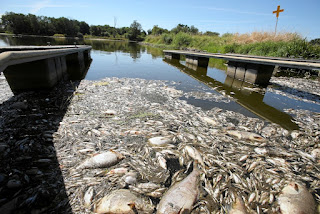Mysterious death of fish in the Oder
Helpers collect dead fish on the banks of the Oder. In the search for the cause, the Polish government has now offered the equivalent of more than 200,000 euros - and the dismissals have started.
Poland is offering a high reward for the clarification of the mass fish deaths in the Oder River. The government suspects that a huge amount of chemical waste was dumped into the river.
Police have offered the equivalent of 210,000 euros for clues leading to the capture of a culprit, Deputy Interior Minister, Maciej Wasik said in Gorzow Wielkopolski on Saturday. "We want to find the culprits and punish the perpetrators of the environmental crime that is probably at stake here," stressed head of government, Mateusz Morawiecki.
Poland's government and authorities are under pressure for being too slow to warn about the fish kill. Politicians and conservationists called the consequences of the Oder pollution an environmental catastrophe. The cause is not yet clear. Laboratory analyses of samples of the water and of dead fish were ongoing.
"I expect several tonnes of fish"
Meanwhile, in the Oder border region in Brandenburg, hundreds of helpers began collecting dead animals on Saturday. In the small town of Lebus, not far from Frankfurt (Oder), an unpleasant smell spread along the shore due to the decomposition of the fish, a dpa reporter described. Birds could also be seen carrying away dead fish. Emergency workers in Lebus wore rubber boots and gloves, among other things. They have to protect themselves from contact with the water and the fish.
"I expect several tonnes of fish to be taken out," said Thomas Rubin for the Märkisch-Oderland district administration. There, he said, about 300 helpers are on the move along about 80 kilometres of the river, especially on the banks. The Mayor of Schwedt an der Oder, Annekathrin Hoppe (SPD), told rbb-Inforadio on Saturday that the helpers were equipped with protective suits for the collection. She said that it could be assumed that substances hazardous to human health were present there.
According to Axel Vogel, Brandenburg's Minister of the Environment, the Oder has a "very high salt load". This is "absolutely atypical", the Green politician said on RBB television. Vogel's ministry explained that the measured salt loads could be related to the fish kill. "According to current knowledge, however, it will not be a single factor that caused the fish kill in the Oder," it said in a statement. The term salt loads refers to salts dissolved in water.
However, the results are "not yet fully meaningful and not conclusive", they said. Further investigation data will be available in the coming week. With regard to mercury findings, Vogel said this would be further investigated.
The handling of the fish kill triggered personnel consequences in Poland. Head of government Morawiecki dismissed the head of the Water Authority and the head of the Environmental Authority for allegedly reacting too slowly to the fish kill in the Oder. In Germany, too, the Federal and State Governments openly criticised Poland for not informing the authorities in time and for not following the usual reporting chain for such events.
Poland's head of government now said he would not rule out further personnel consequences. He admitted that he had only learned about the massive fish kill on 10 August. "I was definitely informed too late." According to the government, Polish authorities had already received initial indications at the end of July that masses of dead fish were floating in the river.


Comments
Post a Comment